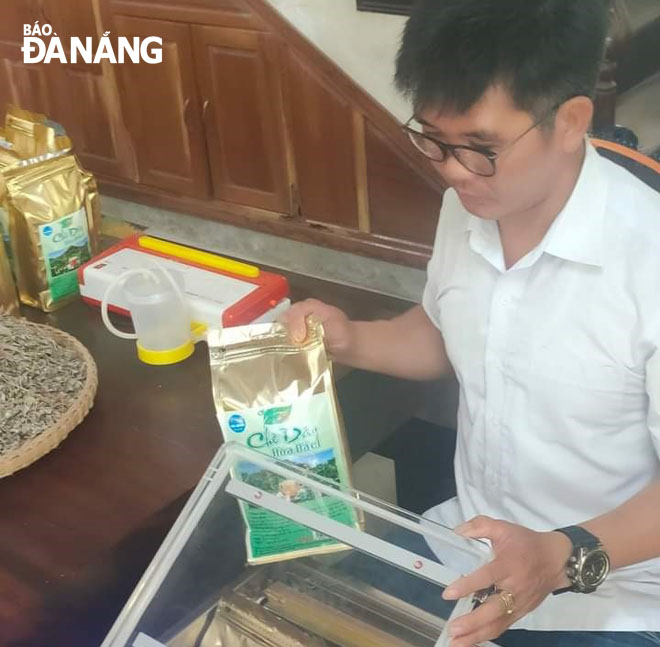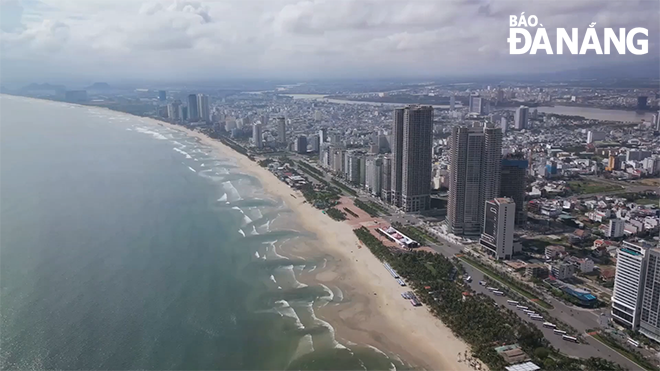Prospering with Da Nang agricultural products
After nearly 5 years of hard work, Mr Le Anh Tu, residing in Hoa Bac Commune, Hoa Vang District, has successfully established a stable 1-hectare vine tea garden. After deducting all expenses, he earns profits ranging from VND 150 to 180 million annually. At the same time, he provides seasonal employment for nearly 10 local workers with a daily income of VND 300,000 per person.
 |
| Mr Le Anh Tu is packaging his vine tea products. |
In 1998, Mr Le Anh Tu volunteered to teach at a school in Hoa Bac Commune and decided to settle there. During those years, the lives of the local people in Hoa Bac were quite difficult, and the education of children in many families received little attention. Therefore, Mr. Tu had to visit each house to encourage the children to go to school. During such visits, he was offered a type of yellow, fragrant, slightly bitter but sweet-tasting water. This drink was made from the leaves of the vine tea plant, a characteristic forest plant of the Co Tu people, considered a "miracle cure" for keeping the Co Tu people healthy.
The vine tea plant prefers moisture, grows wild near waterfalls, and is commonly found in forests at elevations between 700 and 1,500 metres above sea level. The dried branches and leaves of the vine tea plant, when brewed, make a beverage that is good for health. Medical studies have confirmed its effectiveness in treating stomach ailments, anti-inflammatory properties, promoting appetite, and improving sleep quality.
Having mom being a doctor and having a tendency to share knowledge, Mr Tu deeply understands many herbal plants' medicinal properties. Therefore, he has long been dedicated to community health care. Encouraged by his family, Mr Tu had the motivation and determination to create a useful product from this type of tea, serving both society and continuing his mother's career.
Thanks to his diligence, hard work and thirst for knowledge, MrTu made an effort to study the uses, characteristics, cultivation methods, and care of the vine tea plant from the local people beyond the time spent teaching at school. While it is simple to grow for personal use, developing it into a high-quality commercial product that meets market demands is challenging. In the early days, Mr Tu faced a bunch of failures due to a lack of understanding of the growth characteristics, cultivation methods, propagation, soil conditions, and climate in the mountainous region.
However, he simultaneously cultivated and determinedly researched from books, online sources, and local Co Tu people to continue his work. When he heard about a training program on vine tea cultivation for farmers in Nam Giang District, Quang Nam Province, he eagerly participated. With the knowledge gained and insights into the local climate and soil conditions, Mr Tu established his vine tea garden.
In 2015, Mr Tu's first nursery covered an area of 100 square metres, with over 50 seedlings. By 2019, he boldly invested VND 450 million to build a 1-hectare vine tea garden on his family's forest land. The Da Nang Department of Science and Technology, and the Department of Agriculture and Rural Development of Hoa Vang District supported him with VND 100 million. Subsequently, Mr Tu was guided to register for the OCOP (One Commune One Product) programme, and the brand " Hoa Bac Vine Tea- Le Anh Tu" was officially born.
To ensure the healthy growth of the vine tea plants, Mr Tu cast hundreds of concrete pillars, and intertwined sturdy steel mesh to create a framework for the vines to climb, sprout, and shoot. In particular, he designed a system to directly channel water from the stream and installed an automatic misting system to proactively irrigate the tea garden. As a result, the tea plants were not affected by pests and diseases, requiring only daily watering. Hence, the plants did not need to use chemicals to thrive.
As shared by Mr Tu, vine tea can regenerate strong shoots after pruning, so it is harvested every 45 days. After processing, about 350 kg of dried tea is obtained, currently selling at VND 180,000 per kg. With an annual yield of 12 tons of dried vine tea, after deducting expenses, the family earns over VND 150 million, helping to stabilize the economic situation and create jobs for residents.
Thanks to emphasizing responsibility to the community and the principle of clean and safe production, the vine tea products of Mr Tu and his wife are well-received in the market in Da Nang and many provinces nationwide. They won the Second Prize in the Entrepreneurship Ideas competition organized by the Da Nang Women's Union. Recently, the Hoa Bac Vine Tea brand was surveyed by the Da Nang Food Safety Management Board, aiming to introduce it to high-end hotels and resorts in the city.
In the future, Mr Tu plans to invest in modern machinery and equipment to create new products such as tea bags and high-grade vine tea. He also plans to expand the scale of the vine tea garden to 2 hectares and collaborate with local households to actively manage production materials, harnessing the potential and strengths of the region in medicinal forests. This also helps Co Tu people cling to their land, escape poverty sustainably, and improve their lives.
According to Mr Le Minh Tuan, Chairman of the Farmers' Association of Hoa Bac Commune, together with many other farmers, Mr Le Anh Tu has created quality, brand, and added value to local agricultural products, promoting the development of products not only in the Da Nang market but also in many other provinces and cities, providing employment and stabilizing the lives of local residents.
In addition to success in economic activities, Mr Le Anh Tu has also achieved many results in teaching at Hoa Bac Elementary School. Many generations of his students have won medals in competitions organized by Hoa Vang District and Da Nang. For many years, he has been an exemplary soldier at the grassroots level and was awarded a Certificate of Merit by the Da Nang People's Committee.
Reporting by BAO CHAU - Translating by T.VY








